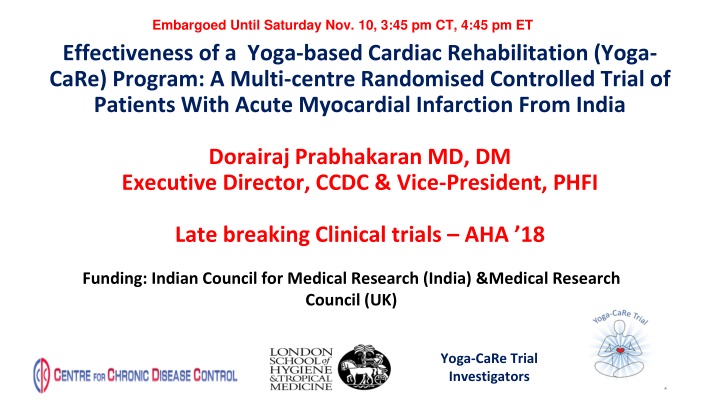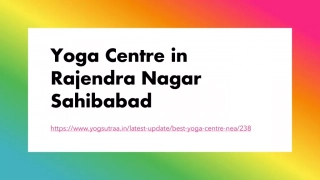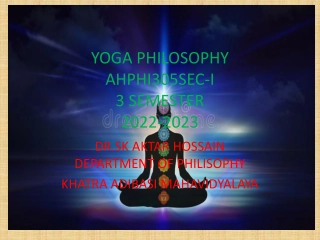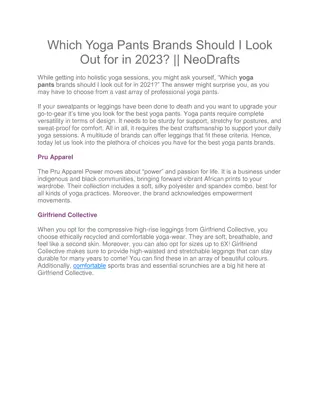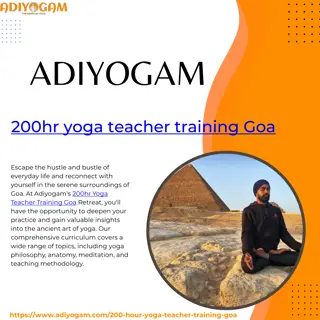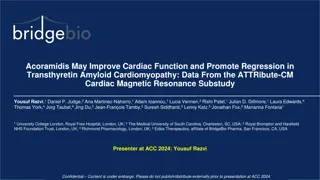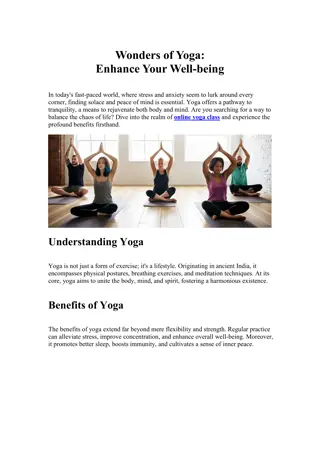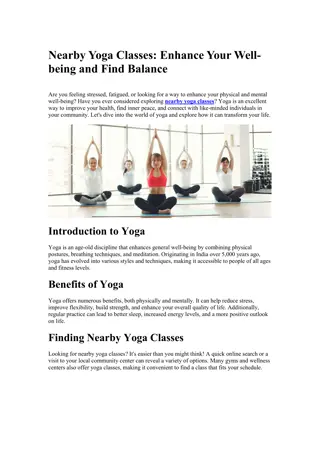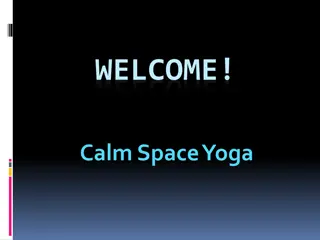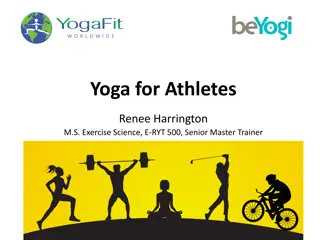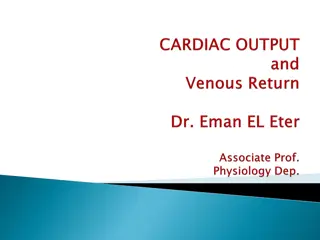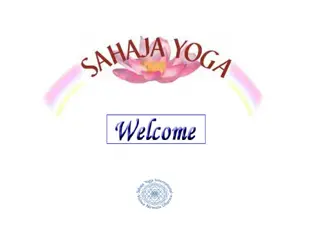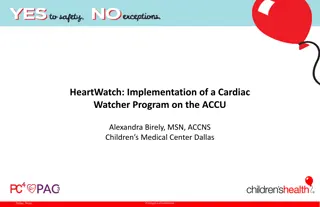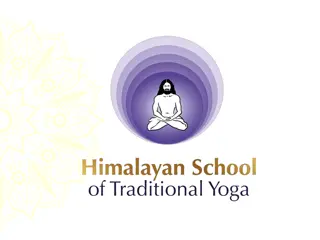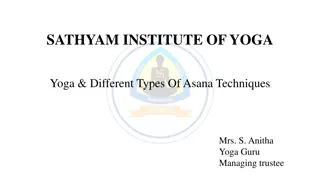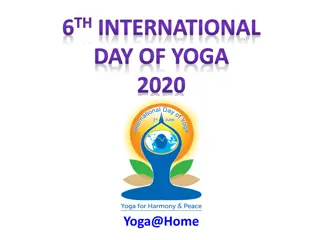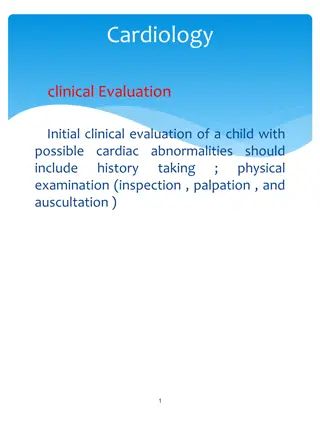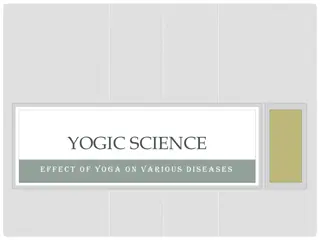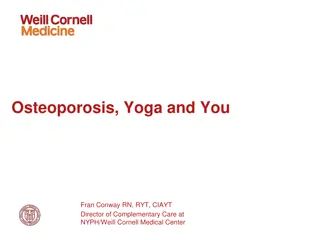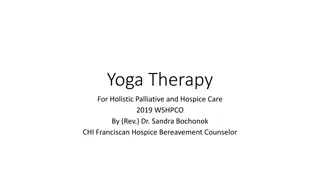Yoga-CaRe Program for Cardiac Rehabilitation
This study investigates the effectiveness of a Yoga-based Cardiac Rehabilitation program for patients with Acute Myocardial Infarction in India. It aims to compare the impact of Yoga-CaRe with Enhanced Standard Care on various outcomes such as time to occurrence of cardiac events, quality of life, return to daily activities, and more.
Download Presentation

Please find below an Image/Link to download the presentation.
The content on the website is provided AS IS for your information and personal use only. It may not be sold, licensed, or shared on other websites without obtaining consent from the author.If you encounter any issues during the download, it is possible that the publisher has removed the file from their server.
You are allowed to download the files provided on this website for personal or commercial use, subject to the condition that they are used lawfully. All files are the property of their respective owners.
The content on the website is provided AS IS for your information and personal use only. It may not be sold, licensed, or shared on other websites without obtaining consent from the author.
E N D
Presentation Transcript
Embargoed Until Saturday Nov. 10, 3:45 pm CT, 4:45 pm ET Effectiveness of a Yoga-based Cardiac Rehabilitation (Yoga- CaRe) Program: A Multi-centre Randomised Controlled Trial of Patients With Acute Myocardial Infarction From India Dorairaj Prabhakaran MD, DM Executive Director, CCDC & Vice-President, PHFI Late breaking Clinical trials AHA 18 Funding: Indian Council for Medical Research (India) &Medical Research Council (UK) Yoga-CaRe Trial Investigators 1
Yoga-CaRe Trial The Rationale Cardiac Rehabilitation (CR) is a Class I indication in post MI patients and has become an integral part of cardiac care in High Income Countries. CR is virtually non-existent in Low-Middle Income Countries due to its high cost and the need for a multidisciplinary team. Even In high income countries uptake of CR is 25-35% and is particularly poor among the elderly and women who may prefer gentler and simpler approaches. High unmet need for CR. In India, need for developing a low-cost, culturally acceptable and effective cardiac rehabilitation, a need that would be filled by Yoga-CaRe should it prove to be efficacious. 2
Why Yoga ? Yoga Cardiac Rehabilitation Stress Reduction: Counselling/ medication for depression Stress reduction : breath control and meditation Physical fitness: Exercise Physical fitness: Yogic postures Lifestyle changes: Smoking cessation, Nutrition counselling and other healthy behaviors Lifestyle changes : Self-restraint (smoking, alcohol) , Healthy diet 3
Outcomes Aims 1. Primary Outcomes a) Time to occurrence of first cardiac event (composite of death, nonfatal myocardial infarction and stroke) & emergency cardiac admissions To compare the effectiveness of Yoga based Cardiac Rehabilitation (Yoga- CaRe), with Enhanced Standard Care b) Quality of life (EQ-5D-5L) at 12 weeks (ESC) in post myocardial infarction 2. Secondary Outcomes patients on cardiac morbidity and a) Return to pre-infarct daily activities at 12 weeks (RNLI) mortality and quality of life. b) Smoking cessation at 12 weeks c) Compliance to prescribed medications at 12 weeks 4
Methods Study sites : 24 centers in India Inclusions Age 18-80 years Study design: PROBE Within 14 days of acute myocardial infarction (WHO/3rd Universal Definition) Willing and able to attend the complete CR program Trial duration: 50 Months (Aug 14-Sept 18) Sample size 3959 Participants 80% power to detect 20% reduction in cardiovascular events event rate in control) Exclusions Patients not likely to complete follow up Self reported regular practice of Yoga (> 3hours a week) (assumption-20% 99% power to detect difference in quality of life Participation in other clinical trials Comorbidity which limits life expectancy <=12 months Analysis ITT Per protocol 5
Intervention and Enhanced Standard Care Development : Structured process. Literature review; Consultation with yoga experts, CR experts and Post MI patients Refinement : Feedback from an internal stakeholder group and an external panel of international experts Piloted with yoga teachers and post MI patients Components of Yoga : 3 health rejuvenating exercises 15 postures 5 breathing techniques 5 meditative techniques Structure: Yoga-CaRe sessions aligned to CR phases Week1: Education on life style (Session 1) Week 3: Meditation and breathing (Session 2) Weeks 5-7: Full Yoga training sessions, twice per week (Sessions 3-8) Weeks 8-13: Full Yoga training sessions , once per week (Sessions 9-13) Week 14+: Self practice at home Control group received enhanced standard care: 3 session educational information before discharge from the hospital and subsequently at weeks 5 and 12 Printed leaflet Delivered by nurse or another member of cardiac care team either individually or in groups to avoid contamination Personnel: Trained Yoga instructors to deliver pre- selected Yoga practices and health education
Consort Flow Diagram Assessed for eligibility (n=6737) Excluded (n=2727) -Not meeting inclusion criteria; IC (n=200) -Declined to participate (n=2527) Randomized (n=4010) Excluded (n=51) did not meet IC -Yoga CaRe group (n=35) -Enhanced Standard Care group (n=16) Evaluable (n=3959) Did not receive allocated intervention ( 1 session; n=160) Death/event before intervention (n=34) Consent withdrawal (n=5) Others Incomplete information (n=121) Did not receive allocated intervention (n=22) Death / event before 17 days (n=20 ) Consent withdrawal (n=2) Enhanced Standard Care (n=1989) Yoga-CaRe (n=1970) ITT Analysis (n=1989) ITT Analysis (n=1970)
Baseline Characteristics -2 Enhanced Standard care n=1989 (%) Yoga-CaRe n=1970 (%) Variables Revascularization 62.1 58.2 4.5 60.7 57.4 3.9 PCI CABG Antiplatelet 98.5 98.5 Dual antiplatelet 83.5 84.3 ACE/ARB 49.4 51.4 Beta blockers 62.6 62.6 Statins 93.2 93.2 High standard of contemporary cardiac care in both arms 8
Baseline Characteristics Enhanced Standard care n=1989 Yoga-CaRe n=1970 Variables Age, years Mean(SD) 53.4 (10.8) 53.4 (11.0) Women 14.1% 13.8% STEMI 76.0% 75.0% Anterior wall MI 57.8% 57.1% Vessel involvement - Single 55.6% 56.4% Past history of CAD 21.2% 22.3% Diabetes 29.1% 28.1% Hypertension 28.7% 30.1% Current tobacco 29.8% 31.0% Physical inactivity 54.3% 53.9% 9
Primary Outcomes (ITT) ESC (n=1989) n (%) YC (n=1970) n (%) Hazards Ratio, 95% CI (unadjusted) p-Value Co-Primary Outcome 1 First Co-Primary outcome 146 (7.3) 131 (6.7) 0.91 (0.72, 1.14) 0.33 Death 77 (3.9) 78 (4.0) 1.02 (0.75, 1.40) 0.99 Non fatal Myocardial Infarction 15 (0.8) 13 (0.7) 0.88 (0.42, 1.84) 0.73 Non fatal Stroke 3 (0.2) 4 (0.2) 1.34 (0.30, 6.0) 0.43 Emergency Cardiovascular hospitalisations 59 (3.0) 48 (2.4) 0.82 (0.56, 1.20) 0.26 HR remains same after adjusting for baseline covariates, risk profiles and treatments at discharge Numerically fewer outcomes in the Yoga-CaRe group, but not statistically significant
Primary Outcomes (ITT) - Kaplan Meir plot of Cardiovascular Events HR[CI] = 0.91[0.72, 1.15] Log rank test, p=0.41 Less than half the number of events as compared to the original assumption
Primary Outcomes (Per-protocol): Kaplan Meir plot of Cardiovascular Events HR[CI] = 0.54 [0.38, 0.76] Log rank test, p<0.001 Completers = those who participated in 10 Yoga-CaRe sessions
Primary Outcome (ITT) Regression Coefficient, 95% CI (unadjusted) ESC (n=1989) Mean (CI) YC (n=1970) Mean (CI) Co-Primary Outcome 2 p Mean Change in EQ-5D VAS Score (from baseline to three months) 9.2 (8.4, 10.1) 10.7 (9.9, 11.5) 1.4 (0.3, 2.5) 0.002 Coefficient remained significant after adjusting for baseline covariates, risk profiles and treatments at discharge Improvement in the Self-rated quality of life was significantly greater in the Yoga- CaRe group
Secondary outcomes: ITT Analysis Outcomes at three months Unadjusted Regression coefficient (CI) p-Value Change in health states - EQ-5D -0.03 (-0.19, 0.13) 0.72 Return to Pre-infarct daily activities 1.17 (0.11, 2.23) <0.001 Outcomes at three months Unadjusted Odds Ratio (CI) p-Value Health states (<6) 1.16 (1.01, 1.34) 0.04 Tobacco cessation 1.14 (0.89, 1.46) 0.11 1.04 (0.91, 1.19) 0.52 High compliance to medication
Conclusions Yoga-CaRe, a yoga based CR, is safe, feasible and significantly improves quality of life and return to pre-infarct daily activities. The clinical outcomes were not different between the two groups (Inadequate power to detect the planned difference due to lower event rate than estimated). Per-protocol analysis showed Yoga-CaRe program to be efficacious in improving clinical outcomes suggesting a potential dose-response relationship. Yoga-CaRe has the potential to be an alternative to the conventional CR programs and address the unmet needs of cardiac rehabilitation for patients in low- and middle-income countries.
Contributors Top Clinical Sites Site-Investigators Dorairaj Prabhakaran (India) & Sanjay Kinra (UK) Principal Investigators DMC Ludhiana Bishav Mohan CH Pune & Bengaluru Davinder Singh Chadha Co-Investigators & Research Team IGMC Shimla Sanjeev Asotra & PC Negi Ambuj Roy Subash Chander Manchanda SJICSR Bengaluru Prabhavathi Ajay Vamdevan K Srinath Reddy SJICSR Mysuru K Sadananda Nish Chaturvedi Alun Hughes JSS Hospital Nagaraj Desai & Sunil Kumar Ian Roberts Stuart Pocock KPKH Belagavi Prasad Shah Ebrahim Chandrasekaran AM SGRH New Delhi Subash Chander Manchanda Kalpana Singh Kaushik Chattopadhyay LSSH Guntur PV Ragahv Sarma Kavita Singh Divya Soni KGMU Lucknow Sharad Chandra Dimple Kondal Praveen Pradeep BLDE Vijapura Shankar Patil Raji Devarajan Nikhil Tandon CARE Hyderabad Calambur Narasimhan Trial Steering Committee, Data Monitoring and Ethics Committee & Endpoint Adjudication Committee AIIMS New Delhi Ambuj Roy GKNM Coimbatore S Natarajan Acknowledgement: Clinical site Research Team Indian Council for Medical Research Yoga-CaRe Instructors Medical Research Council Trial Participants & families
